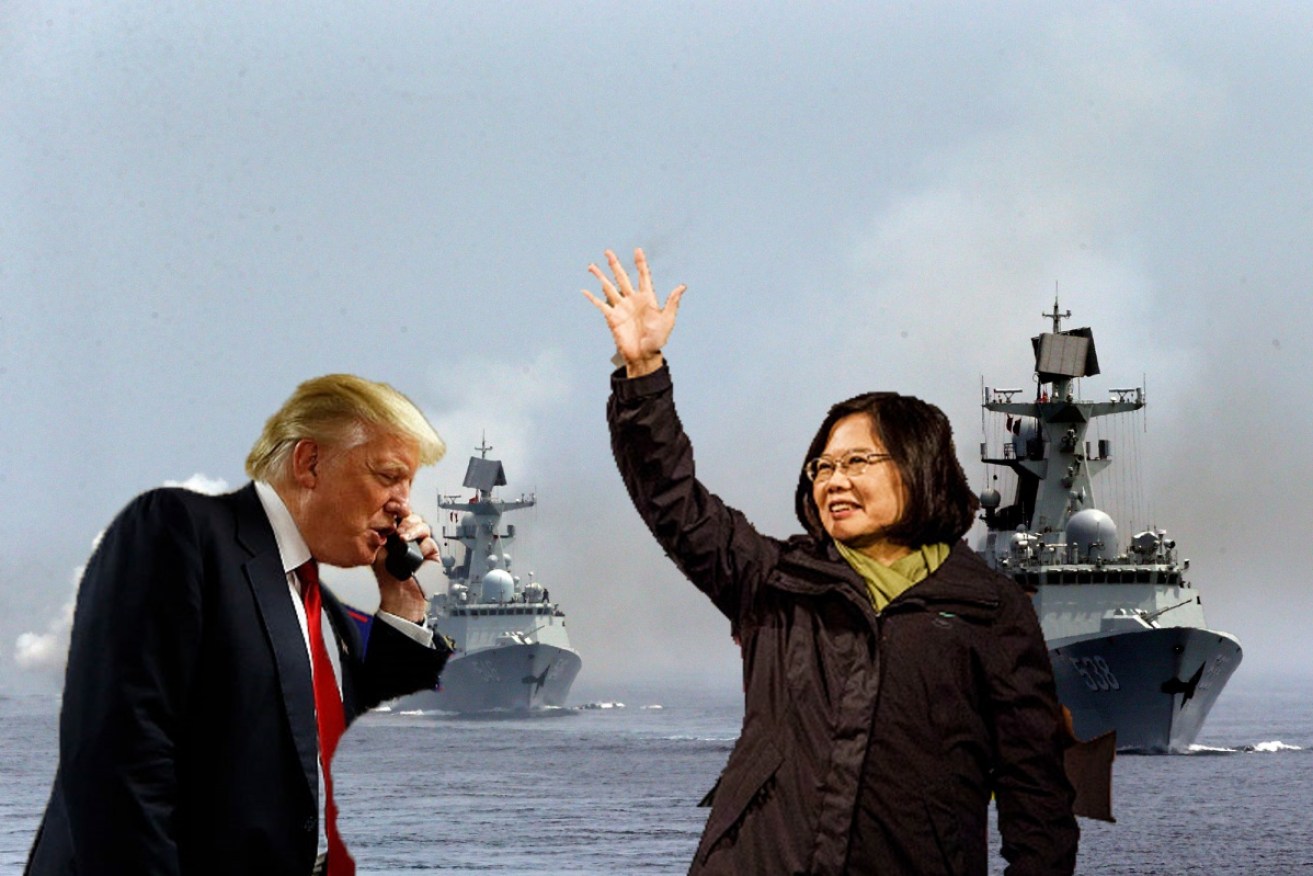China hits back after Donald Trump’s Taiwan phone chat


Donald Trump broke with decades of protocol when he took Tsai Ing-wen's call, and China isn't happy.
United States President-elect Donald Trump broke with decades of carefully respected protocol when he took Taiwan President Tsai Ing-wen’s call on Saturday (AEST), and China isn’t happy.
China lodged a formal complaint with the United States on Sunday after Mr Trump became the first president since 1979 to share an official call with the Taiwan leader.
China views Taiwan as a renegade province and since 1979 the US has acknowledged Beijing’s claim that Taiwan is part of the People’s Republic.
Under protocols known as the ‘One-China principle’, the US does not share formal diplomatic relations with Taiwan, making Mr Trump’s decision to accept Ms Tsai’s call both puzzling and provocative.
“We have noticed relevant reports and lodged solemn representation with the relevant side in the United States,” China’s Foreign Ministry spokesman Geng Shuang said a statement.
“I must point out that there is only one China in the world and Taiwan is an inseparable part of the Chinese territory,” he said. “The ‘one-China’ principle is the political foundation of China-US relations.”
While the US formally severed diplomatic ties with Taiwan 37 years ago, America has maintained close unofficial relations and a commitment to support the Island’s defence.
The Associated Press quoted China’s Foreign Minister Wang Yi as telling Hong Kong’s Phoenix TV that Ms Tsai’s call with Mr Trump was “just a small trick by Taiwan” and would not affect official US policy toward China.
The President of Taiwan CALLED ME today to wish me congratulations on winning the Presidency. Thank you!
— Donald J. Trump (@realDonaldTrump) December 3, 2016
Interesting how the U.S. sells Taiwan billions of dollars of military equipment but I should not accept a congratulatory call.
— Donald J. Trump (@realDonaldTrump) December 3, 2016
Since 2009, the Obama administration has approved $US14 billion ($19 billion) in arms sales to Taiwan, according to AP.
Taiwan’s President released a statement on Saturday describing her call with Mr Trump as an “intimate and relaxed conversation” lasting 10 minutes.
The statement said the pair discussed important policy points, “in particular, to promote the domestic economy and strengthen national defence, allowing the people better lives and a guarantee of security”.
Taiwan’s Presidential spokesman Alex Huang told CNN that both Ms Tsai and Mr Trump agreed ahead of time before making contact.

Tsai Ing-wen was elected Taiwan president in January 2016. Photo: Getty
Mr Trump had previously shared a call with Chinese President Xi Jinping, during which the President-elect’s office said Mr Trump said he believed the two would have “one of the strongest relationships for both countries”.
The Taiwan dispute
The Taiwan dispute dates to 1949 when the Mao Zedong Communist revolutionary army defeated the Nationalist government led by Chiang Kai-shek.
Chiang and his fellow Nationalist leaders fled to Taiwan after their defeat, with both groups claiming to be the legitimate representatives of all China and the civil war never resolved.

Chiang Kai-shek fled to Taiwan after the Communists won Mainland China. Photo: Getty
While Taiwan briefly held a seat at the United Nations representing China, this was relinquished to the People’s Republic in 1971 and in 1979 the US recognised Beijing as the legitimate ruler.
No US president or president-elect is thought to have spoken with their Taiwanese counterpart since that decision.
The Turnbull response
In Australia, Prime Minister Malcolm Turnbull refused to weigh into the discussion on Mr Trump’s controversial phone call.
“I managed to avoid running a commentary during the course of the US election and I’m not going to embark on becoming a US politics commentator now,” he told reporters in Sydney on Sunday.
Government frontbencher Arthur Sinodinos, meanwhile, said the only thing Australia should be concerned with is its own national interest.
“Our national interest is to work with both the US and with China to keep them both engaged in a really productive way in the region,” Senator Sinodinos told ABC TV.








